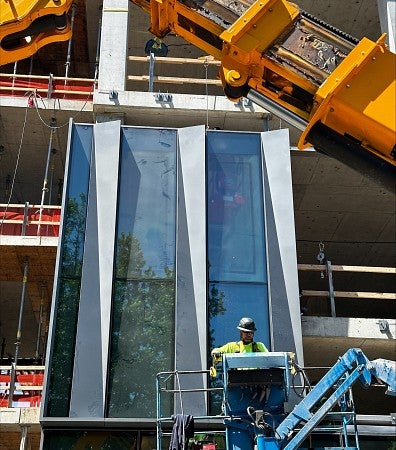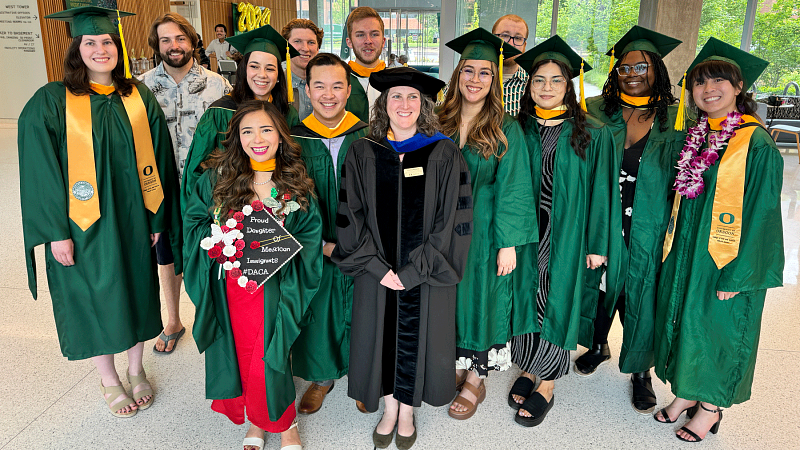Dear Knight Campus Community,
As the academic year winds down, I’d like to recognize our outstanding Knight Campus Graduates, whose ranks grow bigger each year. This year, we are celebrating 121 graduates, including 89 Knight Campus Graduate Internship Program graduates, seven students receiving minors in bioengineering, 13 Knight Campus Undergraduate Scholars, nine students in the Wu Tsai Human Performance Alliance at Oregon and three student employees. Congratulations to all of our graduates!
And speaking of accomplishments worth toasting, I’d like to raise a glass to our newest academic program in Brewing Innovation, which was just approved by the university's Undergraduate Council. This interdisciplinary minor was the brainchild of Jim Hutchison and Nathan Jacobs and will be housed in our beautiful new second floor Fermentation Innovation Laboratory. Brewing will serve as the backdrop for experiential learning and students will employ design thinking as a means of understanding and defining customer needs. They will learn to appreciate and evaluate beer, brew and rapidly prototype new beers, and take inspiration from 13,000 years of human innovation in brewing. Stay tuned to our website for an official announcement and more information on this exciting program.
Perhaps the most obvious sign of our growth and evolution is the ongoing construction of our second major science building, which now rises four stories tall. Each day we see new progress as construction crews lay new floors, fly in steel girders and begin outfitting the exterior with the glass and bent metal panels that will provide the building with its signature appearance — inspired by the very science happening in Building 1. When completed in early 2026, Building 2 will offer additional room for our expanding research labs, academic programs, and entrepreneurial efforts, including the continued expansion of the Papé Family Innovation Center.

Our world class facilities are critical for enabling science and translation and our faculty continue to excel in their research. Dr. Paul Dalton recently garnered major media attention for a collaborative project with scientists from the French personal care company L’Oréal developing a multilayered artificial skin that more accurately mimics real human skin. The advance relies on melt electrowriting, the micro 3D printing technique that Dalton invented.
Dr. Marian Hettiaratchi continues her lab’s busy research program, developing biomaterials to control protein delivery to injured tissues. Later this month she will be recognized with the 2024 Young Investigator Award during the TERMIS World Congress conference in Seattle in recognition of the innovative and impactful work she and her team are pursuing. At another June conference in Raleigh, North Carolina, Dr. Danielle Benoit, Lorry Lokey Chair of the Department of Bioengineering, will be officially inducted as a fellow of the National Academy of Inventors at the organization’s annual meeting. The honor recognizes her contributions to the field of biomedical engineering.
Dr. Keat Ghee Ong has received multiple federal small business innovation awards for his start-up company, Penderia Technologies. The company is commercializing medical devices instrumented with sensors, including smaller, smarter, and more versatile implantables.
Dr. Genny Romanowicz, a clinician-scientist and postdoctoral scholar in my lab, was recently awarded a prestigious K99 Pathway to Independence Award from the National Institute of Dental & Craniofacial Research (NIDCR) for her project characterizing the local immune response during healing in complex craniofacial defects. She is the first Knight Campus researcher to be awarded the grant, which is designed for promising postdoctoral scientists.
We’ve had a run of great speaking events in recent weeks, including the Knight Campus Spring Entrepreneurship Speaker Series featuring Sean McClain, the founder and CEO of Absci — a leading generative AI drug creation company that’s on a mission to create better biologics faster. If you missed the talk, a recording will soon be available on our website. We also hosted our signature community science lecture, Science Knight Out with Prof. Mike Hahn. A video of the talk is now available on our YouTube Channel. Dr. Hahn’s talk on “Boosting Performance and Improving Human Health” offered an exploration of how sensor technologies and the use of machine learning algorithms are changing the game for players in all sports. He explored questions of athletic performance and how new innovations in sports science are making a broader impact on human health.
These questions are primary to our work in the Wu Tsai Human Performance Alliance at Oregon. Now in its fourth year, the Human Performance Alliance continues to catalyze new collaborations, and I’m more excited than ever by the potential of this increasingly global effort to transform human health through discovering and translating the fundamental scientific principles of peak performance. In September, we will host the first global summit for a related initiative known as the Global Sports University Network. This nine-member network, which includes universities from around the world, aims to become a source of higher-education knowledge, research and policy advice in the world of sport.
Another recent collaborative effort was the National Science Foundation-funded Next Gen Biomaterials Workshop. Produced by our Department of Bioengineering, the Materials Science Institute and the Department of Chemistry and BioChemistry, the two-day event brought more than 40 thought leaders in biomaterials from across the country to the Knight Campus to envision how to leverage data-driven design and synthetic biology to enable the next generation of active biomaterials for human health. Danielle Benoit was the driving force behind the workshop. Kudos to her for initiating and coordinating the event and thanks to our faculty and staff for working to make this such a special event.
A collaboration that’s really taking off this year is the Biomedical Data Science Center, a joint initiative between the Knight Campus and the Knight Cancer Institute at Oregon Health & Science University founded with a goal of empowering researchers at both institutions to leverage biomedical data science to detect and fight deadly diseases caused by cellular dysfunction, such as cancer. We recently named Knight Campus Professor Bill Cresko as the co-director of the center at UO. With his expertise in computational biology and long track record in developing genomic tools and super-computing software, Cresko will help connect the Knight Campus to UO researchers in the biological sciences and other areas, including the recently launched School of Computer and Data Sciences.
It’s the people that really make the Knight Campus shine and I am incredibly proud of the hard work and accomplishments of the team we’ve been able to recruit. This includes people like Jodi Myers, senior academic business coordinator, who recently received UO’s Outstanding Employee Award for her on-the-job excellence and her ability to embody respect and inclusion and inspire and motivate her colleagues. Congrats, Jodi — and a shout out to your Knight Campus colleagues for taking time out of their day to support your nomination.
And in case you missed it, five of our Ph.D. students from the Department of Bioengineering — David Frey, Phillip Hernandez, Nicholas Pancheri, Iman von Briesen and Malley Gautreaux — were awarded the National Science Foundation’s prestigious Graduate Research training fellowships. Ph.D students DeShea Chasko and Rose Hulsey-Vincent received honorable mentions, which are awarded to meritorious applicants and considered a significant national academic achievement. That makes a total of eight fellowships over the last four years. For a program that got its start in 2020, that is pretty amazing, and we are so proud of our students.
Since welcoming our first Bioengineering Ph.D. student cohort four years ago with eight pioneering students, we have quickly grown to become one of the largest graduate programs at the UO. Our rapidly growing Ph.D. application pools reflect our rising national profile and are evidence of the attractiveness of our hands-on education and training programs.
We’ve also enjoyed continued recruiting success in our nationally recognized applied master’s program, the Knight Campus Graduate Internship Program (KCGIP). The KCGIP will welcome its latest cohort of students later this month for Professional Development and Orientation Week, which precedes the start of immersive technical coursework.
Our Knight Campus Undergraduate Scholars Program (KCUS) just launched its sixth cohort, our biggest group yet with 21 students. Both the KCUS and KCGIP programs continue to expand access to STEM training for underrepresented groups.
As we reflect back on another busy year filled with exciting challenges, major milestones and notable achievements, I can’t help but feel exhilarated by the transformations that are occurring here on our campus and rippling throughout our region and beyond. New scientific discoveries are being made, new academic programs are taking off, young careers are launching — transformative impact is happening all around us, with many more opportunities ahead on the horizon.

